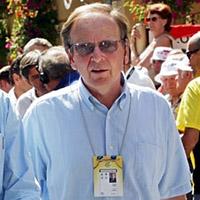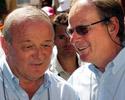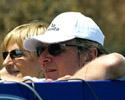News feature: January 23, 2007
An interview with Patrice Clerc: "We're not afraid."
Tour de France organiser ASO confident about upcoming legal procedure and new selection criteria
The divide between the most powerful race organisers in the world and the world's governing body of cycling has never been so deep. For over three years, the Grand Tour organisers, spearheaded by Tour de France management ASO, and the UCI have been in constant conflict over the sport's most recent reform, the ProTour. Now, unable to come to an agreement, the two sides will take their fight to the European Commission. Cyclingnews' Hedwig Kröner spoke to Patrice Clerc, the ASO president, about the conflict and the organisation's future plans.
The organisers of the three Grand Tours, the ASO, the RCS (Giro d'Italia), and Unipublic (Vuelta España) have long objected to the ProTour model. They call the forced inclusion of the 20 ProTour teams 'a closed system' and have came up with their own set of team selection criteria late last year. And, after a year full of doping torments, they decided to reserve the right to refuse participation anyone who may harm their image. The UCI is fighting for the ProTour, and have taken the case to the courts.

|
With the trial in front of the European Commission impending, Patrice Clerc didn't want to comment too much about the issues. "The presidency of the UCI has decided to bring this dissident to the European Commission - the Directorate General for Competition - which means that I can not comment on this today. Although I would have a lot of things to say... I have to spare my entire comments on the subject for the Commission," he said.
The history of the conflict
Clerc did outline the course of events that led to the current situation with the UCI. "Even before the ProTour was officially launched, since 2004, we have always said that we would not adhere to this system. To us, this system opposes the sport and the European sporting model, because it is a closed system. We do not adhere to the concept of a license, either, as it appears to us totally unsuitable to our sport.
Early last year, an agreement between the two sides which mainly consisted of having 18 ProTour teams instead of 20 in the future, looked as if it would be the end of the conflict. But in July, as the Tour de France was battered by Operación Puerto, it was made public that the compromise, had been rejected by the UCI.
"We have always asked that our position be taken into account, and tried against all odds to come to an agreement. And indeed, an agreement was found between all parties on March 30, 2006! The UCI, on the evening prior to the Tour of Flanders, even held a press conference to announce it. But afterwards, the presidency - and I insist on the word 'presidency' - of the UCI thrashed the compromise, which would have been the solution for all of us to reconstruct professional cycling together."
"At the Worlds in Salzburg, an authoritarian decision followed, which said, 'You don't have anything to say, you're going to do as we say and that's it.' Our reaction was that we didn't want to - and we were unable to - belong to a system that we consider to be illegal!" Clerc continued, "That agreement was difficult to achieve, it had needed a lot of work and good faith. The working group [first established in January 2006 - ed.] included the teams' sponsors, team managers, riders, Grand Tours, other race organisers and the UCI. I had a lot of admiration for this group, and especially for the sponsors, who held it together."
"But as this agreement, including all concessions and compromises that had to be made in order to come to it, was refused in an authoritarian, dictatorial manner by a person that has two heads [alleging that Pat McQuaid is still very much under the influence of UCI vice-president Hein Verbruggen - ed.], there is no other choice than legal recourse."
"As this agreement was refused in an authoritarian, dictatorial manner by a person that has two heads, there is no other choice than legal recourse."- Clerc alleges that UCI president Pat McQuaid is still very much under the influence of his predecessor, Hein Verbruggen. |
In the meanwhile, the Grand Tour organisers came up with their own selection criteria, and shared their plans with the teams. "We decided to come up with a system of team selection for our races as of 2008. For 2007, we decided to invite the 18 teams that were already there, that had already raced our events in 2006."
According to Clerc, the then-ProTour teams welcomed the changes. "In the beginning of December, we wrote to all the teams and explained our project, including the ones that would only have the right to participate at our races upon a wildcard invitation. Let me remind you that at time, the ProTour teams were against the further issuing of license, and wanted a sort of moratorium to wait until the situation got clearer. Their reaction was positive; I think it corresponded to what they wanted: a period of time to reflect on a coherent and just system," he said.
Unibet.com gets squeezed
When Unibet.com's license was confirmed by the UCI on December 16, 2006, they were put in the unfortunate position of being a ProTour team without getting the benefit of an automatic invitation to the races ASO, RCS, and Unipublic organise. Clerc denied any responsibility for the predicament. "I would like to say to you that, a priori, their position doesn't concern us. It's a problem between them and the UCI, not between them and us. Unibet was completely informed about our position and our options from the beginning of the month of December. But you know, if you sell something that doesn't belong to you to someone else, I believe there's a name for that..."
When Unibet was given its ProTour license, the UCI had a very different view about their participation in the Grand Tours. "On this occasion, the UCI formally reminds that all the teams benefiting from a ProTour have the right and the obligation to take part in the 27 rounds of the UCI ProTour calendar in 2007. In this sense, the recent declarations of ASO, RCS, and Unipublic must be regarded as completely unfounded from the regulatory point of view," it said in a press release.
Unibet's problems aren't restricted to the confusion over their Tour participation, either. The sponsoring company is currently in a legal proceeding with the French state over French legislation that only allows three companies to offer sports betting via the internet.
Clerc insisted that this had nothing to do with ASO's decision not to invite Unibet to Paris-Nice. "This disagreement between Unibet and the French state and its online betting companies [Francaise des Jeux and PMU - ed.] has also been brought in front of the European Commission. So until the European Commission has ruled on the subject, these online gambling companies are illegal on French soil. We asked the French ministries to give us an official stance on the situation of this team, and other teams that are sponsored by other online gambling companies."
The Tour de France isn't the only race organised by the ASO - will Unibet will be invited to other races? Clerc replied, "Our decision will be based on the quality of the teams that we can invite. At the one-day races, for security reasons we will be able to include more than 20 teams. We will take the final decision on the sporting level, but on the administrative level, it could be imposed on us by French authorities. I'm currently waiting for the response of the ministries."
ASO's future plans

|
So what criteria will ASO apply to select teams beyond 2007? The organisers has announced that they planned to have an automatic qualification for 16 teams as of 2008, with criteria based mainly on performances over the previous two seasons. ASO has vowed to announce the details of these criteria before March 1, 2007, after consultation with the teams and riders. "The basis will of course be on the sporting level," Clerc commented. "First, we want to refine our proposals, and then discuss them with the teams and their representatives, before finalising them."
Recently, the president of the UCI ProTour Council (UPTC), Vittorio Adorni, suggested a reduction in the number of riders from nine to eight to accommodate more wild card entries at the Grand Tours. When asked to comment, Clerc said, "Well, my first reaction would be that of bursting out laughing... . This is a proposal that was initially made by us, ever since October 2004."
"We discussed it with the small commission consisting of M. Verbruggen, M. Saiz, and M. Adorni, and hoped it would get us out of the crisis. We proposed to reduce the number of riders to eight on stage races - as an experiment - to see how it worked out. M. Adorni, at the time, as well as M. Saiz and M. Verbruggen, opposed it and said that it was absolutely necessary to have nine riders to race the Grand Tours. So M. Adorni's proposal today comes two years too late, which I find amusing.
"But it is certainly a suggestion worth studying!" Clerc continued. "We saw that last year [at the Tour], under the circumstances, some teams had to start the race with less than nine riders and still raced satisfactorily, with interesting performances - especially the German team [T-Mobile, which had seven riders after the Operación Puerto exclusions - ed.]."
Protecting the image of the sport
Another very interesting point about the new selection plans of the Grand Tour organisers is that they may decided not to grant certain riders or teams admission to their races if they consider these to harm the image of their race. In other words, some riders previously implicated in a doping case such as Operación Puerto may not be invited, even if they are allowed to race by the UCI.
"If the participation of some persons - be it riders, whole teams or team staff members - harms the image of our sport, we think that it is our responsibility to oppose it."- Clerc on the GT organisers' decision to exclude persons implicated in doping affairs from their events. |
"We think that the state of our sport today is such that we don't have any tolerance margins anymore," Clerc explained. "I'm convinced - and I'm sad to say so - that the greatest problems of cycling are its ethics and its image, and I've been repeating this ever since 2001. It's not a problem of sponsorship guarantees, or licenses. I repeated this over and over, also at public events such as the presentation of the Tour de France. Nobody ever listened."
"But now, after the catastrophes we've experienced in 2006, everybody agrees. Today, we have to show to the whole of the international community of sports, media, and the public, that we are firm determination not to harm the image of this sport anymore. And the way to do this, as far as we are concerned, is on our races. The image of our events, notably the Tour de France, has without a doubt suffered terribly in 2006.
"So, if the participation of some persons - be it riders, whole teams or team staff members - harms the image of our sport, we think that it is our responsibility to oppose it," he insisted.
When asked if he didn't fear legal procedures from the teams or riders that will be left uninvited - even if they are entitled to participate on a disciplinary level - Clerc responded, "Thank God we live in a state that's ruled by the law. This keeps us clear of all things excessive, of authoritarian acts and dictatorial attitudes. I will trust justice - the laws regarding preservation and protection of image are very strong in France, more than in other countries. We're not afraid."
Globalization concerns

|
The UCI, and especially its new president Pat McQuaid, has always advocated the ProTour as a means to internationalize cycling. Just recently, McQuaid spoke to Cyclingnews about his plans to extend the ProTour to the United States, Asia, or Australia, even if that necessitated an equivalent reduction in the European calendar. What did Clerc think about this?
"First of all, the internationalization of a sport is, of course, a good thing," he said. "We are very interested in it, since our company was the first to look at the organisation of a race in China, and has already taken over the organisation of the Tour du Qatar and the Tour du Faso.
"Then again, when you read the latest interviews of M. McQuaid on Western Europe, the way in which he treats it and the comparisons he makes on the 'mafias', you may wonder about his desire to go elsewhere, to Anglo-Saxon countries as he says. If he doesn't like Europe and its federations; if he believes that the way of life is not recommendable, you do wonder about that. But these are rather personal considerations.
"The third point, however, is that when you look at sports like baseball and American football, these are sports which remain pretty much rooted in their countries. Even American basketball! Globalization is thus progressive. Sports like rugby, for example, are much less powerful in many parts of this world. But the internationalization of a sport, in my opinion, comes first and foremost with the transmission of TV footage. Today, a sport or an event can by appreciated globally, independently of where it is carried out. So we have to be certain about the success of internationalization... . It would be unwise to suppress events that already work, that have a successful history and that continue to be precious to cycling, by events that do not have this history, of which we aren't sure if they'll work, if they have an audience and if they correspond to the culture of the country in which they are implanted."
Photography
For a thumbnail gallery of these images, click here
Images by AFP Photo
- ASO President Patrice Clerc and Tour de France director Christian Prudhomme (L) talk before the start of the 200.5 km seventeenth stage of the 93rd Tour de France cycling race from Saint-Jean-de-Maurienne to Morzine, July 20, 2006.
- ASO President Patrice Clerc talks with outgoing Tour de France director and ASO Deputy General director Jean-Marie Leblanc (L) before the start of the 200.5 km seventeenth stage of the 93rd Tour de France cycling race from Saint-Jean-de-Maurienne to Morzine, July 20, 2006.
- President of the Tour de France, Patrice Clerc (R) and President of Editions Amaury Marie-Odile Amaury watch the seventeenth stage of the Tour of Spain between Adra and Granada, September 13, 2006.
Other Cyclingnews interviews with Patrice Clerc
March 25, 2005: "The
ProTour has nothing to do with magic"
December 19, 2005: Staying
true to principles
Cyclingnews recent coverage of the ProTour split
January 23, 2007 - Patrice
Clerc interview: "We're not afraid"
January 13, 2007 - ASO:
No Unibet in Paris-Nice
January 10, 2007: UCI take
ProTour issue to European Commission
January 7, 2007: ProTour
proposes eight-man grand tour teams
December 13, 2006: ProTour
split resumes
July 9, 2006: Clerc: "Negotiations
over ProTour dead", McQuaid reacts to rejection of ProTour
March 29, 2006: McQuaid
cautiously optimistic
March 19, 2006: ProTour
council meets again
March 9, 2006: Saronni:
no advantages in ProTour yet
March 6, 2006: Unibet protests
against ProTour
March 3, 2006: ProTour
versus GT organizers stoush: round 2, March 6

